By Tatum Lyles Flick
Communications Specialist
 Vanderbilt School of Nursing has received a $3 million Health Resources and Services Administration grant from the Department of Health and Human Services to create a training program, standardized set of competencies and certification for community health workers in Tennessee. The new initiative is in partnership with the Tennessee Community Health Worker Association and Rural Health Association of Tennessee. The Community Health Worker Training Program of Tennessee, which kicks off with informational sessions in early 2023, will train up to 90 people per year to help their communities.
Vanderbilt School of Nursing has received a $3 million Health Resources and Services Administration grant from the Department of Health and Human Services to create a training program, standardized set of competencies and certification for community health workers in Tennessee. The new initiative is in partnership with the Tennessee Community Health Worker Association and Rural Health Association of Tennessee. The Community Health Worker Training Program of Tennessee, which kicks off with informational sessions in early 2023, will train up to 90 people per year to help their communities.
Community health workers are employed by social service agencies, clinics, hospitals, schools and health departments, and are crucial for those who have limited access to medical resources.
“They most often speak the language and share the culture of their community, and they help integrate medical information from health care professionals into everyday life,” said Project Director and VUSN Instructor Tonya Elkins, MSW, adding that community health workers generally have no formal medical training, but know their neighbors well.
They also understand potential barriers that residents face when they need care—everything from mistrust of medical professionals and misconceptions to transportation issues.
“They help people get appropriate access for their health care and help with social resource needs, like food insecurities, housing or other services,” said Associate Professor Christian Ketel, DNP, FNAP, the program project evaluator.
The combined efforts of the School of Nursing, the Tennessee Community Health Worker Association and the Rural Health Association of Tennessee will bolster community health workers across the state.
“This community health worker training program will provide professional development, training and certification to the often-underrepresented community health worker workforce,” said Nikayla Boyd, executive director, Tennessee Community Health Worker Association. “Our partnerships’ statewide reach in offering these services will continue to highlight the importance of community health workers in Tennessee, leading to program and job sustainability and improved health outcomes for Tennessee.”
The training program will be free and students will receive a stipend of up to $7,500 per year to offset costs such as childcare or a change in employment. The program will include some virtual training components, with in-person training primarily on the job and with help from a mentor.
Elkins and Ketel plan to recruit participants from rural areas and minority communities across Tennessee, with the expectation that the program will help reduce health inequities. They will also provide additional training for those already in the profession. Admission requires that the applicant is legally allowed to work in the United States and has a high school diploma or its equivalent.
Currently, the community health worker profession lacks a clear statement of what a community health worker must know or what skills one must have to be successful in the position—an issue many states are in the process of addressing.
“When COVID hit, community health workers were the people who were able to reach out and make an impact,” Elkins said. “Because they were already trusted to convey health messages, they were able to link people to resources.”
Vanderbilt School of Nursing has a long history of supporting community health efforts. Elkins, who will manage the training program, also directs the school’s Maternal Infant Health Outreach Worker Program (MIHOW), which offers peer mentoring to help economically disadvantaged and geographically isolated communities improve health outcomes for those who are pregnant and for young children. Best practices and School of Nursing experience with that program will be used in creating and implementing the new community health worker program.
“Tennessee Community Health Worker Association’s partnership with the Vanderbilt School of Nursing in this HRSA-funded program aligns directly with our mission and vision,” Boyd said. ”We will work closely with Tonya Elkins to expand the award-winning MIHOW program’s community health worker curriculum to meet the needs of community health workers and related programs which focus on a wide variety of health issues and concerns.”
Community health workers made a difference through the MIHOW program, notes Elkins. Parents who receive MIHOW services report lower stress, use more positive parenting practices and have better maternal and child health outcomes in comparison to those who do not.
“VUSN fully supports and understands the importance of community health workers in bridging the gaps between clients and providers,” Boyd said. “While Tennessee Community Health Worker Association trains community health workers and will advocate for this workforce’s continued service and development in Tennessee, VUSN’s solid administrative support and formal and informal links to Tennessee Community Health Worker Association and community health workers assure administrative sustainability. In addition, the Rural Health Association provides support to organizational partners and trainees through its community health worker apprenticeship program.”
The HRSA grant’s main objective is to increase the number of trained community health workers within an area. Elkins and Ketel hope to also increase Tennessee’s ability to support them long-term, and will hand the program off in year three to the Tennessee Community Health Worker Association.
“The School of Nursing will support the grant to create community workers across the state, and support the Community Health Worker Association to create infrastructure to provide education into the future,” Ketel says. “Through the grant, VUSN will support them, train them and leave the community health worker infrastructure in the state better. We want to make the world a better place. It’s about leveraging grant funds to bring the largest, most long-term impacts to the community.”